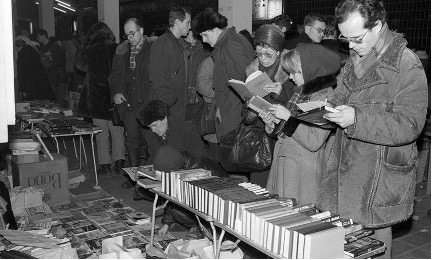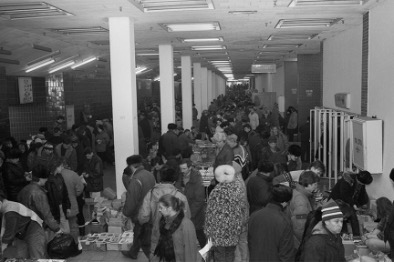Filed Under: Print > Literature > Olympic Stadium Book Market
Olympic Stadium Book Market
[2 items]
Olympic Stadium (Olimpiiskii sportivnyi kompleks), built for the 1980 Olympic Games, is located northeast of Moscow’s center, near the Prospekt Mira Metro station. When built, it was the largest covered sports arena in Europe, holding that title until 2017. In December 1987, it hosted the first Western rock band to play in the Soviet Union, Uriah Heep, and, in the years before 1991, welcomed acts like Pink Floyd and Black Sabbath. Only later, however, did the stadium complex play its most important role in the emerging post-Soviet public sphere—not because of the events taking place in its main space, but through the market that burgeoned in its outer corridors. In the wake of the January 1992 Presidential decree on free trade (ukaz o svobodnoi torgovle), many public spaces quickly transformed into makeshift marketplaces, attracting merchants and buyers of everything from homegrown produce to cigarettes and imported clothing. One of the first markets in Moscow, Izmailovo, soon became too small for a booming business: the book trade. And so, in 1993, a group of publishers got together and rented the spacious outer corridors of Olympic Stadium to ply their flourishing trade in the printed word.
The Olympic book market occupied four floors across the south and west faces of the stadium, functioning as both a wholesale and retail distributor. In the early 1990s, as translations of Western bestsellers—some authorized, many pirated (Stephen King, for instance, first heard of his Russian translation from a bestseller list, not from a publisher or a translator)—flooded the market, with print runs often topping 100,000 arriving at the stadium early in the morning. As one shopper recalls: “A truck would come in with some book, five thousand packages’ worth. Half would be sold immediately, as soon as the truck got into the loading dock. People were standing in line and were tossed packages, which they grabbed and dragged away somewhere.” These “grabbers” were mostly Moscow retailers—buyers not only for the large bookstores in town, but also for the various newsstands and kiosks that dotted the city, including, at that time, in the Metro. The balance of a print run was sold at the market itself, which was open to both wholesale and retail shoppers. But the experience wasn’t for the faint of heart. As one buyer remembers, “walking around Olympic Stadium was terrifying” because “packaging was always thrown into the aisles, flooding everything with that packing paper.” And of course, there was no climate control, so in the summer months, “it got so hot in there that people fainted.”
The market was at the center of the Moscow book trade and became a “Mecca for book pilgrims from all over Russia.” As Soviet distribution networks broke down, provincial centers—even relatively large cities—found themselves cut off from the publishing industries in the capitals. Wholesalers traveled to Moscow, sometimes covering thousands of kilometers by car, to supply their local book markets. Through their travels, they established informal exchange networks that sometimes faded, sometimes formalized as the Russian economy lurched through the 1990s.
By the middle of the decade, the Olympic book market had become a romanticized symbol of the confluence of free trade and free press. “At Olympic, commodity-exchange values had long held sway,” Lev Gurskii wrote in a 1995 murder mystery, Changing Places (Peremena mest), set in the book industry. “It was a whirlpool that sucked into its maw millions of volumes in hardback and softcover, in cellophane and in dustjackets. And it was simultaneously a cornucopia through which any publication, printed wherever, could find its way to any other place in the country. Olympic Stadium was a stock exchange, a barometer, an academy of sciences, and a gas pump, a great magnet for everyone who was ready to spend money on paper smeared with typographic ink and bound in quarto or in folio—and even more so for those who could turn paper into money.”
The Olympic book market occupied four floors across the south and west faces of the stadium, functioning as both a wholesale and retail distributor. In the early 1990s, as translations of Western bestsellers—some authorized, many pirated (Stephen King, for instance, first heard of his Russian translation from a bestseller list, not from a publisher or a translator)—flooded the market, with print runs often topping 100,000 arriving at the stadium early in the morning. As one shopper recalls: “A truck would come in with some book, five thousand packages’ worth. Half would be sold immediately, as soon as the truck got into the loading dock. People were standing in line and were tossed packages, which they grabbed and dragged away somewhere.” These “grabbers” were mostly Moscow retailers—buyers not only for the large bookstores in town, but also for the various newsstands and kiosks that dotted the city, including, at that time, in the Metro. The balance of a print run was sold at the market itself, which was open to both wholesale and retail shoppers. But the experience wasn’t for the faint of heart. As one buyer remembers, “walking around Olympic Stadium was terrifying” because “packaging was always thrown into the aisles, flooding everything with that packing paper.” And of course, there was no climate control, so in the summer months, “it got so hot in there that people fainted.”
The market was at the center of the Moscow book trade and became a “Mecca for book pilgrims from all over Russia.” As Soviet distribution networks broke down, provincial centers—even relatively large cities—found themselves cut off from the publishing industries in the capitals. Wholesalers traveled to Moscow, sometimes covering thousands of kilometers by car, to supply their local book markets. Through their travels, they established informal exchange networks that sometimes faded, sometimes formalized as the Russian economy lurched through the 1990s.
By the middle of the decade, the Olympic book market had become a romanticized symbol of the confluence of free trade and free press. “At Olympic, commodity-exchange values had long held sway,” Lev Gurskii wrote in a 1995 murder mystery, Changing Places (Peremena mest), set in the book industry. “It was a whirlpool that sucked into its maw millions of volumes in hardback and softcover, in cellophane and in dustjackets. And it was simultaneously a cornucopia through which any publication, printed wherever, could find its way to any other place in the country. Olympic Stadium was a stock exchange, a barometer, an academy of sciences, and a gas pump, a great magnet for everyone who was ready to spend money on paper smeared with typographic ink and bound in quarto or in folio—and even more so for those who could turn paper into money.”

